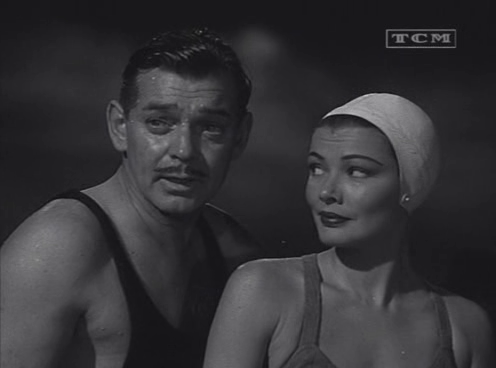Director: Delmer Daves
Clark Gable, Gene Tierney, Bernard Miles, Richard Haydn, Belita, Kenneth More, Karel Stepanek, Theodore Bikel, Anna Valentina, Frederick Valk.
For Never Let Me Go Clark Gable has dusted off his American correspondent role from Comrade X. In that very funny comedy, Gable was playing an American newspaperman covering the Soviet Union before World War II. He's back at his correspondent's desk in this film. However here he's deadly in earnest as a man driven by love to get his Russian bride out of the police state. Sadly the film was dated from its release with the prominent use of newsreel footage involving Joseph Stalin. The film was released on May 1, 1953 and Stalin had died in March of 1953. The state was the same, but the personalized red bogeyman that Stalin had become was no longer there. I'm sure that must have lessened the impact for those who saw Never Let Me Go in the theater. During the war Gable meets ballerina Gene Tierney and in the spirit of the wartime alliance they fall in love and get married. But when the shooting war against Hitler stops and the Cold War starts, no one tells them NYET concerning romance. The increasingly cynical tone of Gable's stories make him an undesirable in the Soviet Union, he gets deported and Tierney is left behind. The Soviets don't recognize marriage and romance with the enemy. Clark's not going to take that lying down. With Richard Haydn, another man who married a Russian girl left behind, they hire Bernard Miles who has a seaworthy craft and plan a rescue. It's quite a plan and a last minute hitch should have told any sensible person to try another day. Of course that's not what happens, but it does render the last minute rescue somewhat silly. Tierney and Gable make a sincere of pair of romantic lovers. Even without the personalization of Stalin, the film is an accurate reflection of the times. Russians are a mighty suspicious lot of people, before, during, and after the Soviet Union. Kenneth More has a very nice role as a television broadcaster presumably for the BBC who helps the leads with some coded messages in his broadcasts. Gable was getting a bit old for these kind of romantic daring do roles by 1953 though. It's not one of the top films of his career or in that last decade of that fabled Gable career.











































No comments:
Post a Comment